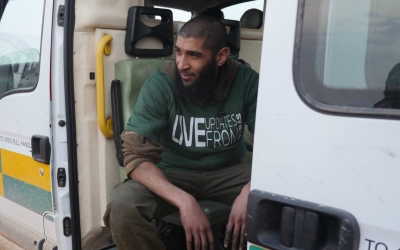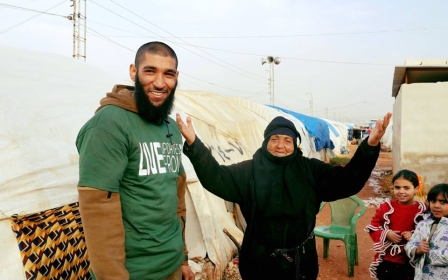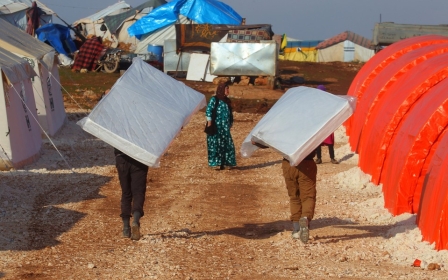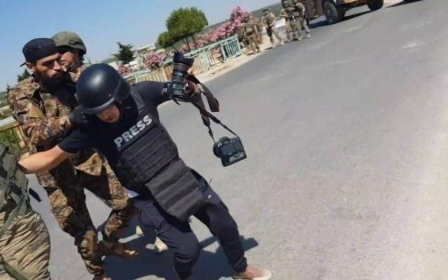British aid worker Tauqir Sharif arrested by HTS in Idlib
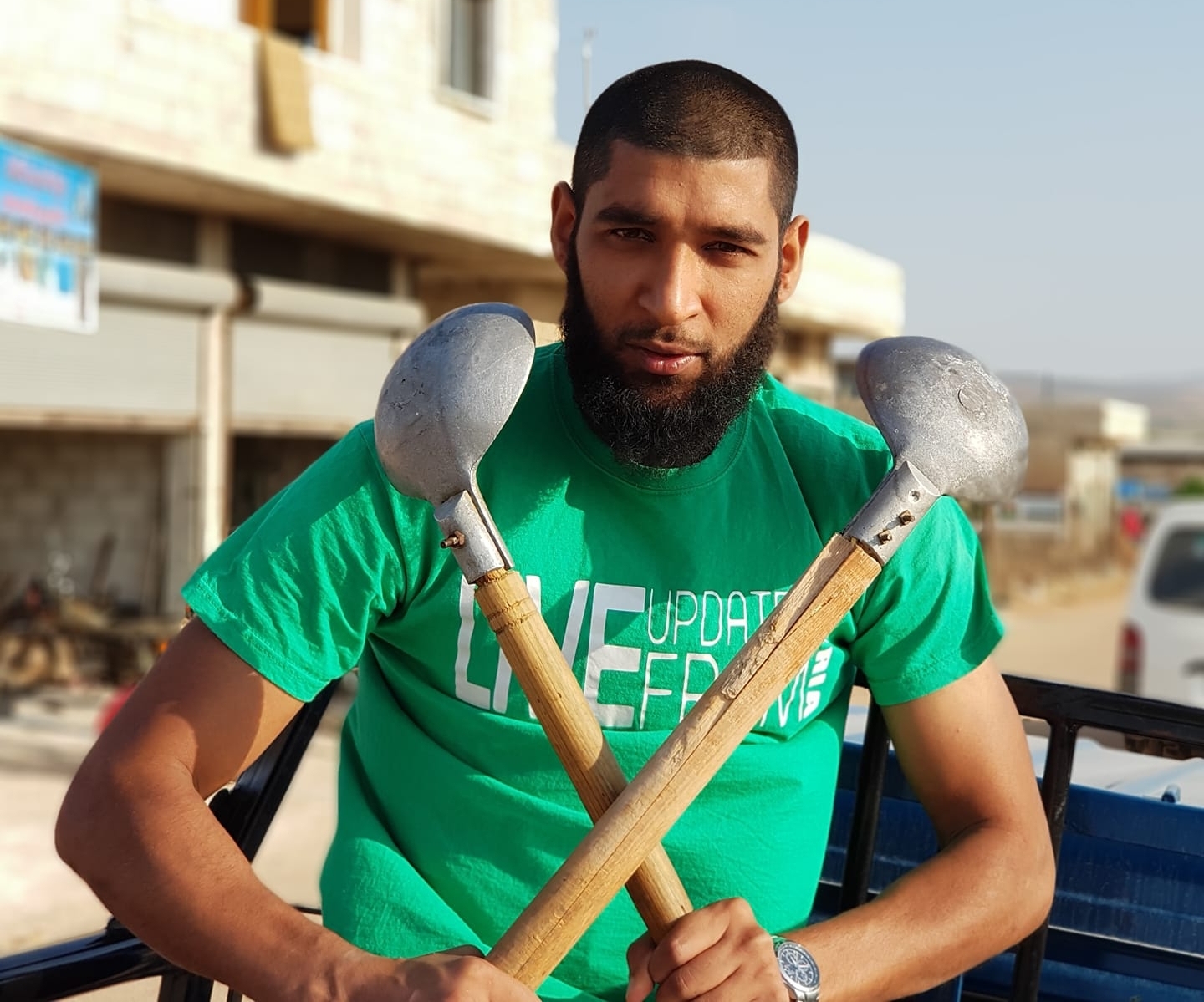
A prominent British aid worker based in northern Syria's Idlib province has been arrested by Hay'at Tahrir al-Sham (HTS), his family has confirmed.
Tauqir Sharif, who is originally from London, was detained by members of the militant group on Monday evening, the Sharif family told Middle East Eye in a statement.
“We can confirm Tauqir Sharif was detained by the group known as HTS in northern Syria,” the statement said.
“He has not been kidnapped and there hasn't been any demands or ransom. We pray to Allah he will be released sooner rather than later.”
Bilal Abdul Kareem, a journalist in Idlib who first reported the arrest, told MEE that Sharif had been detained by HTS security personnel at a house near the Atmeh refugee camp between 8.30pm and 9.30pm local time on Monday.
New MEE newsletter: Jerusalem Dispatch
Sign up to get the latest insights and analysis on Israel-Palestine, alongside Turkey Unpacked and other MEE newsletters
“There were about 15 guys that showed up and knocked on the door of the house that he was in. When he answered, they arrested him,” he said.
Sharif's detention was also confirmed by his aid organisation, Live Updates from Syria, on a post on its Instagram page, which said he had been taken to an unknown location.
In a later post on Facebook, Racquell Hayden Best, Sharif's wife who is also from the UK, said that masked men had come to the family's home and searched the building.
She said she had requested a formal statement from HTS about why Sharif had been detained.
Sources told MEE that HTS security personnel also raided the houses of a number of foreign nationals linked to Sharif, confiscating laptops and mobile phones and shutting down Live Updates from Syria offices and projects.
Sharif has been based in Atmeh, close to the Turkish border, since 2013. Last year he revealed that he was among a number of UK nationals in Syria to have been stripped of their citizenship by the British government.
The government revoked his nationality in 2017 on the grounds that he was assessed to be “aligned with an al-Qaeda-aligned group” and could “present a risk to the national security of the United Kingdom”.
Sharif denies any links with armed groups or proscribed organisations. He says his aid organisation employs around 200 people and runs 41 aid projects in Idlib, the last area of Syria still under the control of Syrian opposition forces.
Over the course of Syria’s war he has become one of the most high-profile foreign nationals living in Idlib, via broadcasts on his own social media channels, and through coverage of his work by media outlets, including the BBC, Channel 4, ITV, CNN and MEE.
Wave of arrests
HTS is the coalition of militant fighters, including some factions formerly aligned with al-Qaeda, that controls most of Idlib.
The group is currently conducting a wave of arrests targeting prominent figures in the province. On Monday it also detained a former commander, Abu Malek al-Tali, who split from HTS in April in opposition to a Turkish-Russian deal which had halted a Syrian government offensive against Idlib earlier this year.
Tali formed his own breakaway faction, which earlier this month announced a new operations room in Idlib in alliance with other hardline militant groups, including the al-Qaeda-aligned Hurras al-Din and many foreign fighters.
Sources told MEE that HTS accuses Sharif of being linked to Abu al-Abd Ashidaa, another militant leader arrested by the group over the creation of the new operations room.
Many foreign nationals in Idlib rely on protection from local armed factions because of the lack of security and the threat of kidnapping, robbery and assassination by criminal gangs or militant groups.
A local relief director told MEE that Sharif specialised in distributing aid to foreign nationals who do not receive support from local organisations, including orphaned children and widows.
He suggested that HTS was seeking to cut off all relief to factions which had joined the new operations room, including aid supplies to those associated with the groups involved, as a form of collective punishment.
In a video posted on YouTube early on Tuesday, Abdul Kareem called on HTS to release Sharif immediately or to formally charge him and offer him a “clear path to justice”.
“There have been too many incidents where people have been detained, there has been no formal charge written and there has been no noticeable trial. We are calling for Hay'at Tahrir al-Sham to put an end immediately to these type of detentions without a formal written charge,” he said.
Writing on Facebook, Hayden Best described her husband as "a man who has given up everything to come here and help those who are oppressed".
Moazzam Begg, the outreach director of British human rights group Cage which has advocated on Sharif's behalf in his citizenship case, also called for him to be released.
“Despite his immense sacrifices, Tox [Sharif] has endured assaults by the Asad regime, survived bombing attempts by ISIS [the Islamic State group] and had his nationality revoked by the British government without any evidence presented against him,” said Begg.
“Tox has been detained by HTS secret police. I hope they understand how much Tox has endured in his efforts to help the people of Syria and that they return him to his family at once.”
'[He is] a man who has given up everything to come here and help those who are oppressed'
- Racquell Hayden Best
Sharif told MEE in November that he had decided to boycott his own appeal against the loss of his British citizenship in protest at what he described as an “affront to justice”.
In citizenship revocation appeals the government can draw on intelligence from the security services that is heard by the court in secret, meaning that appellants and their lawyers cannot see all of the evidence being presented against them.
Because rendering someone stateless is illegal under international law, only dual nationals can be stripped of citizenship. Critics say this has created a "two-tier system", which discriminates against naturalised citizens, immigrants and their children who may be entitled to another citizenship by birth.
The British government assessed that Sharif was entitled to Pakistani citizenship through his parents. He says he has only visited Pakistan once, as an aid worker after flooding in 2010, and has effectively been left stranded in Syria.
Middle East Eye delivers independent and unrivalled coverage and analysis of the Middle East, North Africa and beyond. To learn more about republishing this content and the associated fees, please fill out this form. More about MEE can be found here.


